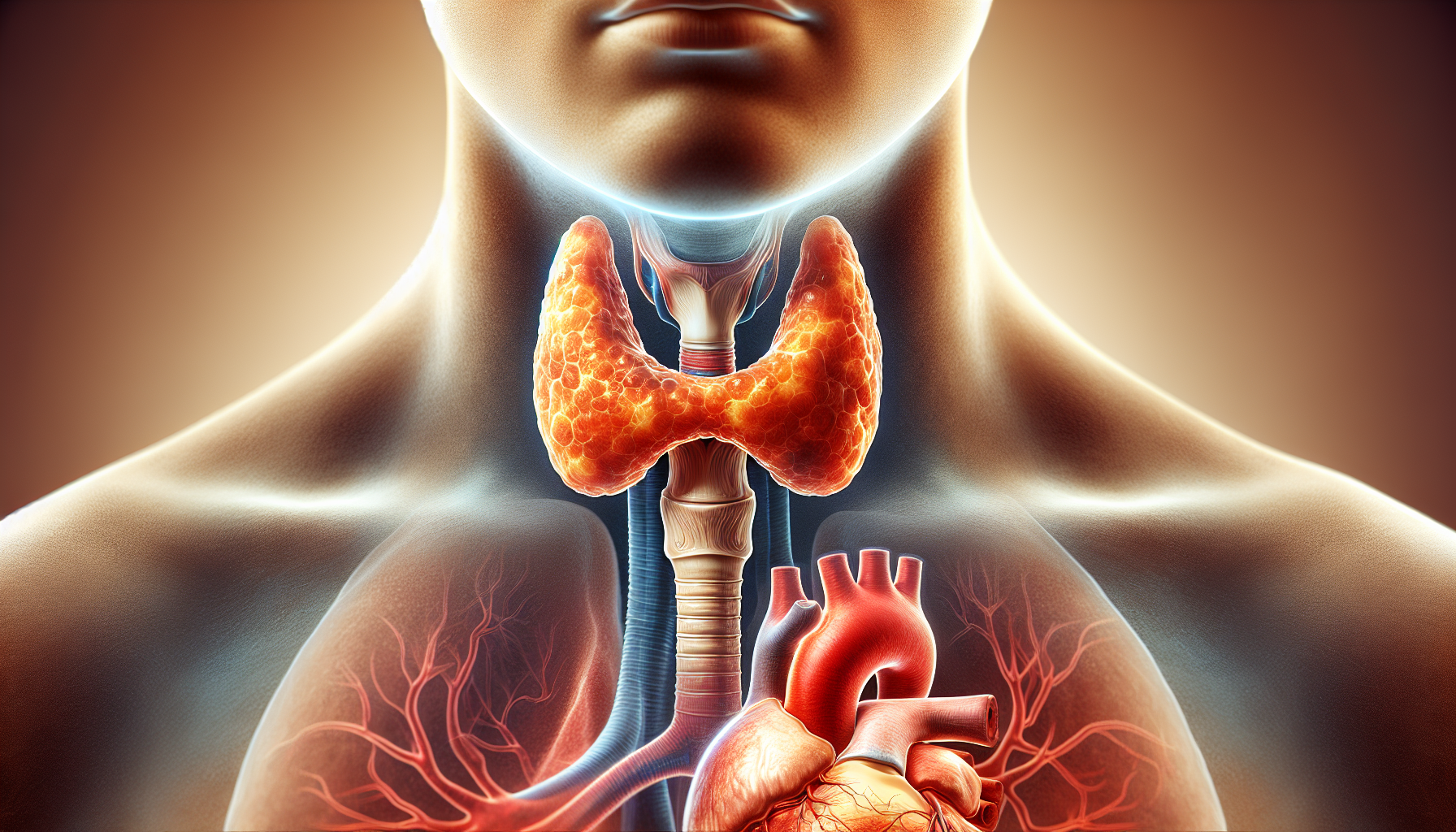Thyroid function and heart health are intricately connected. The thyroid, a butterfly-shaped gland in the neck, plays a vital role in regulating metabolism, body temperature, and energy production. However, its influence extends beyond these areas, significantly impacting the cardiovascular system. Understanding this relationship is crucial for maintaining overall health and preventing heart-related issues.
The Thyroid-Hormone Influence on Heart Function
Thyroid hormones, primarily thyroxine (T4) and triiodothyronine (T3), have direct and indirect effects on the heart and vascular system. They increase the heart rate, enhance the force of contraction, and promote relaxation of the smooth muscle in the blood vessel walls, leading to decreased vascular resistance.
When thyroid hormone levels are imbalanced, it can lead to conditions such as hypothyroidism (low hormone levels) or hyperthyroidism (high hormone levels), each with distinct implications for heart health.
Hypothyroidism and the Heart
In hypothyroidism, the heart rate may slow down (bradycardia), and blood vessels can become less elastic, leading to increased blood pressure and the risk of atherosclerosis. There’s also an association with elevated levels of low-density lipoprotein (LDL) cholesterol, known as the ‘bad’ cholesterol, which further increases the risk of heart disease.
Hyperthyroidism and Cardiovascular Risk
Conversely, hyperthyroidism can cause a rapid heart rate (tachycardia), palpitations, and arrhythmias, such as atrial fibrillation, which is a significant risk factor for stroke. The increased heart rate and contraction force can lead to hypertrophy of the heart muscle, potentially resulting in heart failure if left untreated.
The Interplay of Thyroid Disorders and Heart Health
It is essential to diagnose and manage thyroid disorders promptly. For more detailed information on cardiovascular health, visit our cardiovascular health section.
Autoimmune Thyroid Disease and Heart Conditions
Autoimmune thyroid diseases, such as Graves’ disease and Hashimoto’s thyroiditis, can have profound effects on heart health. Graves’ disease, which can cause hyperthyroidism, has been linked to an increased risk of heart rhythm disorders. Hashimoto’s thyroiditis, often leading to hypothyroidism, may contribute to heart disease through associated risk factors like raised cholesterol levels.
Subclinical Thyroid Dysfunction
Even subclinical thyroid dysfunction, where hormone levels are borderline abnormal, can have cardiovascular implications. Subclinical hypothyroidism is associated with an increased risk of heart failure and other cardiovascular events, especially in older adults.
Thyroid Hormone Replacement and Heart Health
Thyroid hormone replacement therapy is a common treatment for hypothyroidism, but it must be carefully monitored. Excessive amounts of thyroid hormone can lead to symptoms similar to those of hyperthyroidism, including an impact on heart health.
Supporting Heart Health in Thyroid Disorders
Medication Management
Medication management is a cornerstone of treating thyroid-related heart issues. Beta-blockers, for example, may be used to manage symptoms of hyperthyroidism, such as a rapid heart rate and high blood pressure. It’s also crucial to regularly monitor thyroid hormone levels to adjust medication as needed. For insights into medication and supplements, explore our dedicated section.
Lifestyle Interventions
Lifestyle interventions play a significant role in managing heart health, particularly in those with thyroid conditions. Regular physical activity, a heart-healthy diet, and avoiding smoking can mitigate cardiovascular risk factors. For those with hypothyroidism, lifestyle changes can help lower high cholesterol, while in hyperthyroidism, they can help manage blood pressure and heart rate.
Monitoring and Regular Check-Ups
Regular monitoring of thyroid function and cardiovascular health is essential, especially for individuals with diagnosed thyroid disorders. Health professionals may recommend more frequent check-ups to keep an eye on the thyroid’s impact on the heart.
Current Research and Further Reading
Research continues to uncover the complex interactions between thyroid function and heart health. Recent studies suggest that maintaining optimal thyroid hormone levels is beneficial for cardiovascular health, highlighting the importance of individualized treatment plans.
For further reading on heart health, consider these resources:
- Balancing Work-Life to Improve Heart Health offers insight into managing stress and lifestyle for better cardiovascular outcomes.
- Strategies to Manage Arrhythmia and Maintain Heart Health discusses the management of heart rhythm disorders, which can be related to abnormal thyroid function.
- Understanding the Impact of Air Pollution on Heart Health explores environmental factors that can affect both thyroid function and heart health.
For niche and specific resources on the topic, consider the following external websites:
- The American Thyroid Association provides guidelines and research articles on the management of thyroid disorders and their impact on the heart.
- The National Institute of Diabetes and Digestive and Kidney Diseases offers comprehensive information on thyroid diseases, including their relationship to heart health.
- The Endocrine Society publishes studies and clinical practice guidelines that delve into the endocrine system’s influence on cardiovascular health.
In conclusion, the relationship between thyroid function and heart health is multifaceted and significant. Understanding this connection is vital for individuals with thyroid disorders and those looking to maintain optimal cardiovascular health. Through proper management, monitoring, and lifestyle adjustments, it is possible to support heart health even in the presence of thyroid abnormalities.



